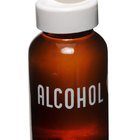
Your husband drinks too much and you are worried about him. His drinking is not only harmful to his health, but negatively impacts your relationship. As drinking gets worse, it takes time away from a couple, creating an emotional distance that is tough to overcome, according to the American Association for Marriage and Family Therapy. You want your husband to seek the help he needs and get your marriage back on track. Confronting him won’t be easy, but being prepared may boost your confidence and help the conversation flow smoothly.
Circumstances
The ideal time to talk to someone with an alcohol problem is soon after an alcohol-related incident, such as a big argument, according to This Emotional Life on PBS.org. Pick a time when your husband hasn’t been drinking. Choose a private location where you can talk uninterrupted, such as your home. Know what you want to say ahead of time. It might be beneficial to gather your thoughts, write them down and look over them as you talk. Tell your husband how you feel and that you are worried about him. Don’t make accusations, lecture or argue. Stay calm, focused and be nonjudgmental. Listen to what he has to say without interrupting.
Denial
Your husband may deny having an issue with alcohol. Denial is common among people who drink too much. It is a major obstacle to overcome before help is sought. The desire to drink is often so strong that people rationalize their drinking, even when it is clearly causing issues in their life, according to HelpGuide.org. Your husband may minimize the amount he drinks, make light of the consequences of his drinking or claim you are being dramatic. For example, he may say he only has a few drinks each night to unwind from the stress of his job and that doesn’t equate to a drinking problem. Be prepared to discuss specific alcohol-related incidents and the consequences of his behavior. If he is in denial, don’t give up on him. Let him know that you are there for him if he should decide he wants to seek treatment.
Enabling
Don’t make excuses for your husband or cover for him. For example, don’t call his boss and tell him your husband is sick when he has a hangover. When you cover for him, he doesn’t suffer the consequences of his drinking and the behavior will continue. You can’t make him quit drinking or fix his problems for him. He has to do it himself. If he decides to seek treatment, be patient. Recovery takes time. If he continues to drink, boundaries need to be set. For example, you might skip social events where he will be drinking.
Treatment and Support
It’s imperative that you look out for yourself and get the support you need, says HelpGuide.org. Dealing with someone with an alcohol issue is emotionally exhausting. You may blame yourself for your husband’s problem or feel shame, anger and frustration. It is important to know someone who understands what you are going through. Consider going to a support group, such as Al-Anon, which is for family and friends of someone with an alcohol problem. This gives you the opportunity to talk honestly with people who understand what you are going through. Many people find this experience comforting.
Related Articles

The Effects of Alcohol on a Marriage

How to Deal With an Alcoholic Husband

Chocolate Martini: How Many Calories?

Do I Need to Break Up With My Boyfriend ...

Gluten-Free Energy Drinks

What to Do When Your Girlfriend Is ...

Alcoholism & Its Effects on the Sober ...

How to Maintain a Friendship with an ...

Setting Limits With Alcoholic Parents

Calories in Peppermint Extract

How to Make a White Russian Without ...

The Best Way to Cover up Vodka

How Much Is a Single Serving Size of a ...

Can Tri-Luma Be Used to Fade Acne Scars?

What Is Good to Mix With Chocolate ...

Calories in Rum Vs. Vodka

How to Store Rubbing Alcohol
Ways to Make Tomato Juice Taste Better

How to Get Your Boyfriend to Stop ...

Fat-Free and Sugar-Free Jell-O Pudding ...
References
Writer Bio
Stacey Elkins is a writer based in Chicago. She earned a Bachelor of Arts in psychology from Southern Illinois University in Carbondale and a Masters in social work from the University of Illinois in Chicago, where she specialized in mental health.
Photo Credits
Medioimages/Photodisc/Photodisc/Getty Images